- Daily & Weekly newsletters
- Buy & download The Bulletin
- Comment on our articles
Perfect mix: Brussels’ Community Kitchen feeds refugees and is a stepping stone to integration
In a quiet residential street behind Brussels’ stylish Avenue de la Toison d’Or, a team made up largely of volunteers quietly and efficiently produces 5,000 meals a week to feed the city’s constant flow of refugees and asylum seekers.
Community Kitchen operates every day from the cellar of Holy Trinity Church in Ixelles. Part of a network of social and charitable organisations, it supplies almost 80% of the hot food distributed to people in need at the Red Cross’s Humanitarian Hub in Avenue du Port.
The non-profit social kitchen is not only committed to providing nourishing meals to the most vulnerable in society. By including refugees in its core team, it encourages them to contribute to Brussels life.
Some 100 volunteers come to assist each week. Divided into morning and afternoon shifts, they chop and prepare vegetables and portion the steaming casseroles of nutritious vegetarian food into individual containers that are picked up by the Red Cross twice a day.
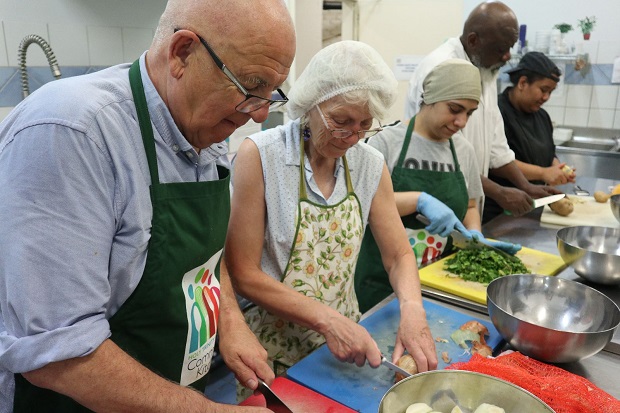
Volunteers also staff the foodbank, in the foyer of the building. A new initiative, it opens every Monday afternoon to provide some 50 needy families with essential items and fresh produce. Importantly, it does not ask them for documents.
All this activity is carried out behind the unassuming façade of Holy Trinity in Rue Capitaine Crespel. While Community Kitchen is an entirely independent set-up, it operates under the auspices of the Anglican church.
From 200 to 5,000 meals a week
The kitchen’s activity has mushroomed since its launch in 2019. Project director Gayl Russell (pictured below) is the founder and the driving force behind it.
A specialist in drafting EU legislation, the British lawyer and Holy Trinity congregation member was volunteering at the Salvation Army. While struggling to make soup on a single hob in a tiny kitchen close to the Bourse one day, her mind wandered to the church’s facilities. “I thought, ‘this is ridiculous, we have this enormous kitchen there that we’re not using’.”
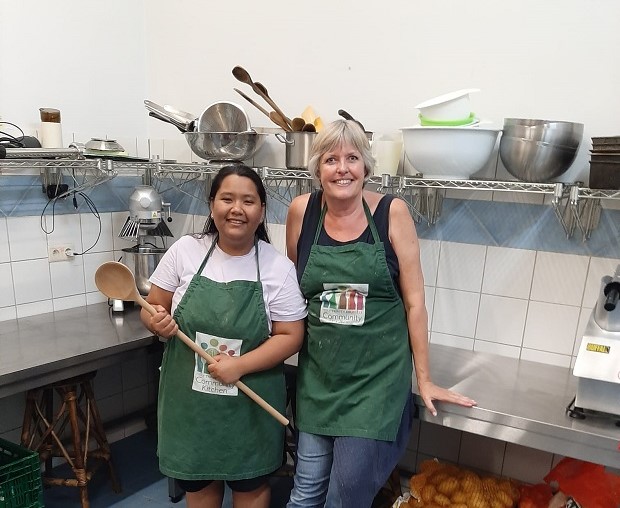
After presenting the idea to the church council, Russell and a small team started producing 200 meals a week. “Then Covid struck and everything exploded, even though the need for what we were doing has always been there.”
With the Red Cross requiring a reliable partner to supply meals for its Hub, Community Kitchen stepped up. “It was initially something to occasionally do as a volunteer,” says Russell. “If you’d told me I’d be managing a project making 200,000 meals a year and employing three people, I’d have said ‘no way’.”
She’s quick to credit the church’s network of charitable organisations. They include Serve the City, which provides most of the volunteers and delivers and distributes many of the meals, L’Olivier, which manages the food bank, and Oasis.
“We were also able to tap into this enormous pool of goodwill in the city. Every time we said ‘let’s do more meals’, we opened another shift on the ServeNow app and people responded.”
With a full-time kitchen manager, Akkara, and two part-time operations managers, Aline and Nezka, now on staff, Russell no longer handles the day-to-day running of the project.
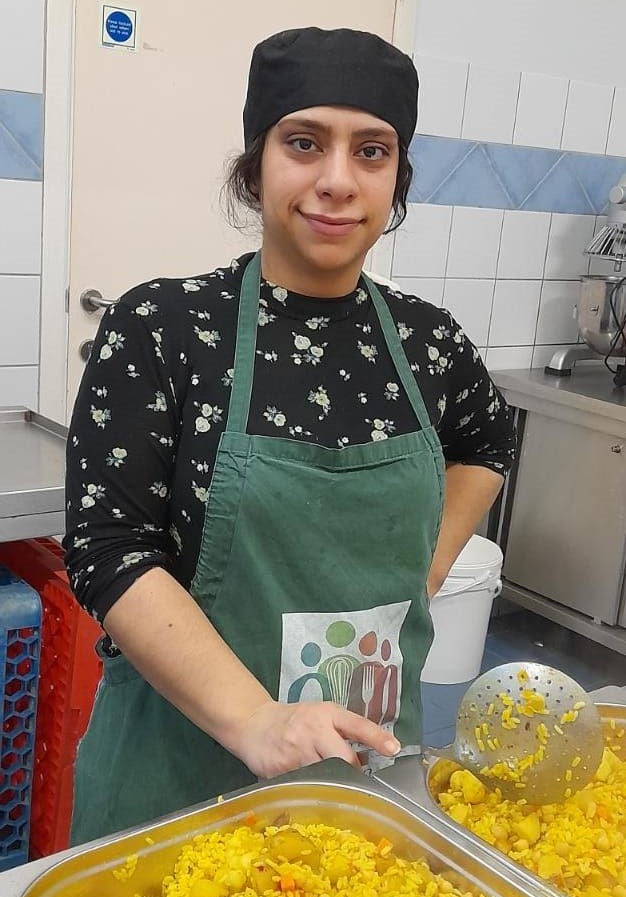
Roya’s story
One of Community Kitchen’s success stories is kitchen volunteer Roya, an Iranian refugee (pictured above).
After nine years seeking asylum in Belgium, she’s just heard that her application has been successful. Recommended by Oasis, an organisation that helps women in precarious situations, her volunteer role in the kitchen played a major part in gaining the right to remain and legally work in the country.
Russell hopes that Roya, “a fast and very good multi-tasking cook” can eventually be given an official contract – though her long-term ambition is to be a tram driver. “On a personal level, we are absolutely delighted for her, but we also feel very proud that the kitchen has contributed,” she says.
Community café to open
Integration is at the heart of the project’s philosophy. It aims to be a welcoming and inclusive space for everyone, while offering friendship and the chance to learn new skills.
That’s why the spacious basement facilities are being revamped to house a Community Café, serving coffee – a new Italian espresso machine is on order – plus cake and light snacks. It’s due to open in the spring, with a pre-launch festive meal planned for guests on 24 December.
“The café will be open to everybody, including families visiting the food bank. If people can afford to pay, they’ll be asked to make a donation,” says Russell (pictured with Akkara above), who is hoping people will also wander in from the nearby busy shopping streets.
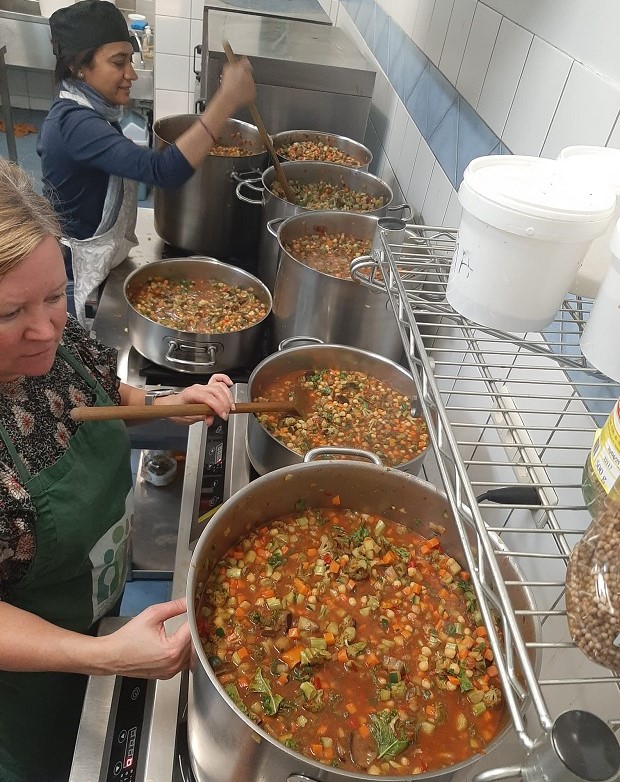
“When people come, there’ll be deliveries and food trolleys trundling past. So they will see that by buying a coffee and a bowl of soup, they’re actively contributing to the kitchen.”
The daily meals supplied to the Red Cross could also be on the menu. “It’s part of our USP: if you come here, you’re eating the same tasty food.”
Reliant on fundraising
Community Kitchen currently runs with a €150,000 annual budget. With no state support, its finance is underpinned by Church of England related organisations, which have specific funds for refugees. Rice is provided for free by the Red Cross, while fresh produce for the food bank and some of the kitchen’s vegetables are donated by organic market The Barn.
Individual donations are also important, with law firms, the Brussels Rotary Club and the Brussels Women’s Club among generous supporters. From January, donations of €40 or more to the kitchen are tax deductible.
The kitchen counts on these donations to just about break even, but it cannot fully guarantee future employment contracts. “We never know where we’ll be in six months,” says Russell. “While we’re always looking for the cheapest way of cooking, it would be nice to be able to offer more treats.”
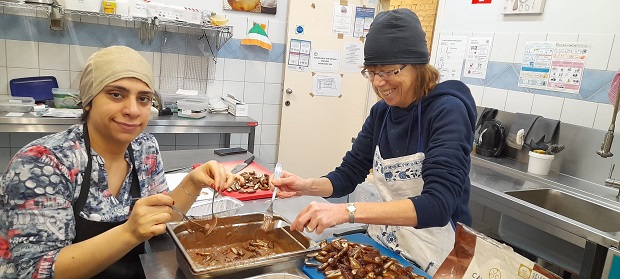
For the Christmas meal deliveries on 24 and 25 December, the kitchen is again stretching its budget to make the dishes a little more special. Fresh herbs will be included and a festive dessert of chocolate and coconut covered dates is on the menu (pictured, Roya and Rachel making the date confection last year).
Volunteers needed
The kitchen has a constant need for volunteers. Its current rota is a mix of ages, nationalities and backgrounds.
“It’s like the United Nations here,” says Russell. “We often have a coffee or meal after a shift, and around the table there could be people from Italy, Germany, Iran, Syria, Pakistan, and everything from students and retired Commission officials to homeless people.”
While cooking, portioning and chopping are always called for, the café project presents an additional challenge. “We are opening our space to everyone, including people in difficult situations, so we need volunteers who are trained in how to welcome and interact with them.”
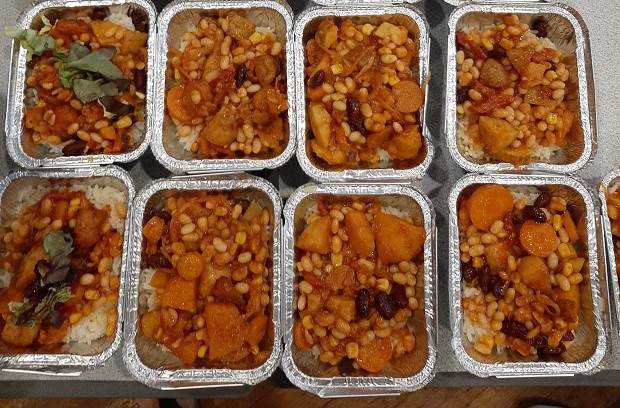
Personally rewarding
For Russell, the kitchen and its recent massive expansion “is, without question, the most rewarding thing I have ever done”.
She considers herself fortunate to be in a “privileged position” and able to dedicate so much time to the project through being self-employed. “It’s certainly more rewarding than teaching people how to draft legislation,” she says with a laugh.
“I use so many different skills. One minute I’m mucking in doing the washing up, other times I’m presenting the project at a big event or dealing with grant applications and helping the treasurer manage the budget.”
Community Kitchen
Rue Capitaine Crespel 29
Ixelles












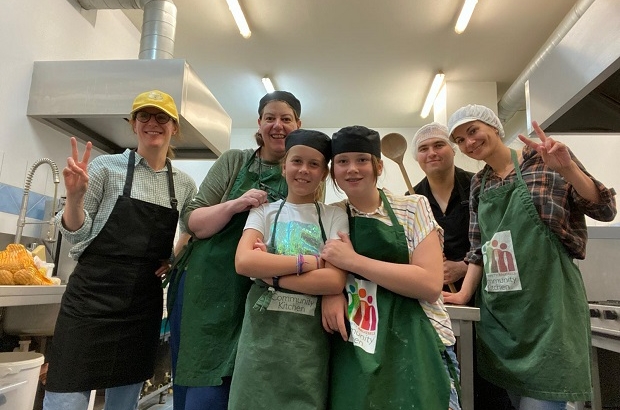







Comments
Great article on the outstanding work done by the Community Kitchen and its volunteers.